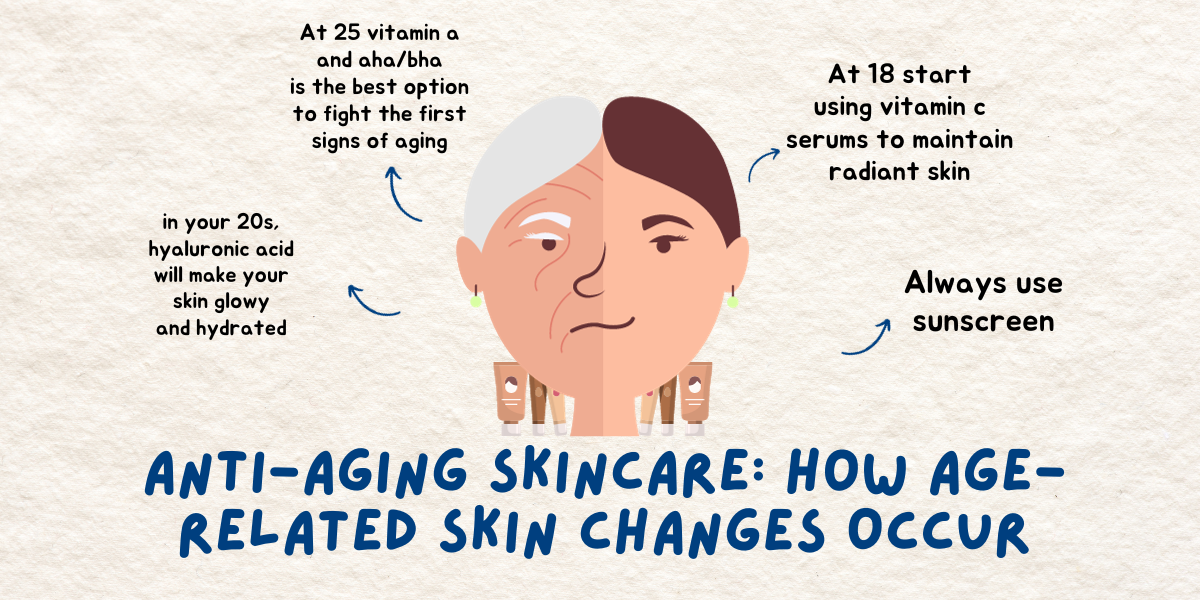Anti-Aging Skincare: How Age-Related Skin Changes Occur
Ageless Beauty: Understanding How Skin Changes Over Time
Anti-Aging Skincare: Unraveling the Science of Age-Related Skin Changes
Aging is an inevitable and natural process that affects all aspects of our bodies, including the skin. As we grow older, our skin undergoes a series of physiological changes that can leave it looking and feeling different. Understanding these age-related skin changes is the first step towards effective anti-aging skincare. In this blog post, we’ll explore the science behind how our skin ages and what you can do to maintain a youthful and radiant complexion.
The Science of Aging Skin
-
Collagen and Elastin Reduction:
- Our skin’s firmness and elasticity are caused by the proteins collagen and elastin. As we age, their production decreases, leading to sagging skin and wrinkles.
-
Cell Turnover Slows Down:
- The rate at which our skin cells renew themselves diminishes with age, resulting in a duller complexion and longer healing times.
-
Dehydration:
- Aging skin tends to lose moisture more easily, making it prone to dryness, flakiness, and fine lines.
-
Decreased Sebum Production:
- Sebum, the skin’s natural oil, decreases with age, potentially leading to dry skin and a loss of the skin’s protective barrier.
-
Sun Damage Accumulation:
- Over time, exposure to UV rays leads to the accumulation of sun damage, causing age spots, uneven skin tone, and fine lines.
Preventing and Managing Age-Related Skin Changes
-
Sun Protection:
- The most effective anti-aging strategy is sun protection. Regular use of sunscreen can prevent UV-induced damage.
-
Skincare Routine:
- A well-rounded skincare routine that includes cleansing, moisturizing, and exfoliating can help maintain skin health.
-
Anti-Aging Ingredients:
- Ingredients like retinoids, hyaluronic acid, and antioxidants can be incorporated into your skincare routine to combat signs of aging.
-
Lifestyle Factors:
- Eating a balanced diet, staying hydrated, getting enough sleep, and reducing stress can all contribute to healthier, more youthful-looking skin.
-
Professional Treatments:
- Dermatologists offer a range of treatments, including chemical peels, microdermabrasion, and laser therapy, to address age-related skin concerns.
The Role of Genetics
While genetics play a significant role in how our skin ages, lifestyle choices and skincare practices can mitigate the impact of genetic predispositions. It’s never too late to start an anti-aging skincare routine, and understanding the science behind age-related skin changes is your first step towards achieving timeless beauty.
Conclusion
Age-related skin changes are a natural part of life, but with the right knowledge and skincare practices, you can age gracefully. Embrace your skin’s journey and take proactive steps to protect, nourish, and rejuvenate it. A combination of science-backed skincare, a healthy lifestyle, and a positive attitude towards aging can help you maintain youthful and radiant skin for years to come.





